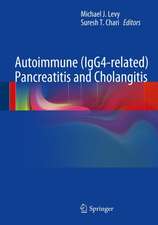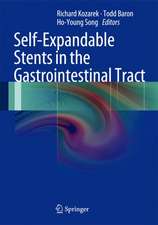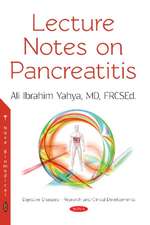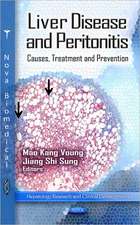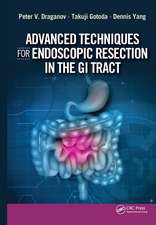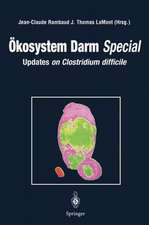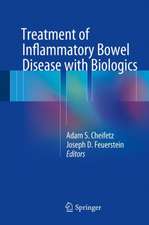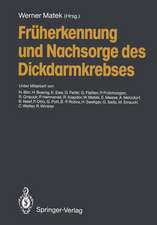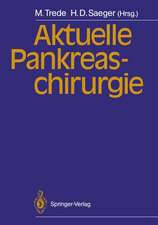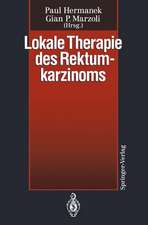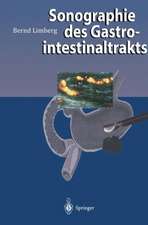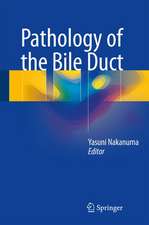Endoscopic Follow-up of Digestive Anastomosis
Editat de Giuseppe Galloroen Limba Engleză Hardback – 8 apr 2014
| Toate formatele și edițiile | Preț | Express |
|---|---|---|
| Paperback (1) | 332.29 lei 38-44 zile | |
| Springer – oct 2016 | 332.29 lei 38-44 zile | |
| Hardback (1) | 373.47 lei 3-5 săpt. | |
| Springer – 8 apr 2014 | 373.47 lei 3-5 săpt. |
Preț: 373.47 lei
Preț vechi: 393.13 lei
-5% Nou
Puncte Express: 560
Preț estimativ în valută:
71.47€ • 74.34$ • 59.00£
71.47€ • 74.34$ • 59.00£
Carte disponibilă
Livrare economică 24 martie-07 aprilie
Preluare comenzi: 021 569.72.76
Specificații
ISBN-13: 9788847053694
ISBN-10: 8847053692
Pagini: 151
Ilustrații: VIII, 151 p. 76 illus., 60 illus. in color.
Dimensiuni: 178 x 254 x 17 mm
Greutate: 0.54 kg
Ediția:2014
Editura: Springer
Colecția Springer
Locul publicării:Milano, Italy
ISBN-10: 8847053692
Pagini: 151
Ilustrații: VIII, 151 p. 76 illus., 60 illus. in color.
Dimensiuni: 178 x 254 x 17 mm
Greutate: 0.54 kg
Ediția:2014
Editura: Springer
Colecția Springer
Locul publicării:Milano, Italy
Public țintă
Professional/practitionerCuprins
Preface.- Section 1 Diagnostic procedures and follow-up.- Analysis of surgical risk factors in tailoring digestive anastomosis.- Impact of flexible endoscopy in the evaluation of digestive anastomosis.- Methodology and appropriateness of the follow-up.- Timing and protocols of endoscopic follow-up in operated patients after - esophageal surgery - gastric surgery - small bowel surgery - colo-rectal surgery. Intraoperative endoscopy in the evaluation of digestive anastomosis: which role?.- Contribution of Endo-Ultra Sonography.- Augmented endoscopic imaging in the study of digestive anastomosis: does it really work and how?.- Section 2 – Therapeutic procedures of anastomotic complications.- Physiopatology and treatment of anastomotic ulcer: an emerging pathology?.- Endoscopic treatment of anastomotic recurrences in oncologic patients.- Therapeutic endoscopy for the treatment of anastomotic strictures: - techniques of dilation (semirigid, idropneumatic, TTS, OTW) - self expanding stenting (metal, plastic and biodegradable) - thermal techniques (LASER, APC, incisional).- Therapeutic endoscopy for the treatment of anastomotic dehiscences - self expanding stenting (metal, plastic and biodegradable) - clipping (standard, OTSC) and suture - endosponge - biological glues.- Emostatic procedures in bleeding anastomosis.- Endoscopic treatment of anastomotic complications after bariatric surgery.
Notă biografică
After earning his medical school degree, Professor Giuseppe Galloro earned his post-graduation specialization in general surgery, both with honors. Once his post-graduate training as jr. doctor in General Surgery Department (prof. F. Mazzeo, University “Federico II”, Naples) was over, he was appointed as assistant and then resident fellow at the same department. He later went on becoming a consultant in the Digestive Surgical Endoscopy Unit and Researcher in General Surgery (prof. C. Catanzano, of University “Federico II”, Naples). His excellent work brought on his nomination in 2004 as professor of General Surgery at the University “Federico II”, Naples and his becoming Head of the Section of Diagnostic and Therapeutic Endoscopy of Non Neoplastic Diseases of the Digestive System, Biliary Tract and Pancreas, at the same University Hospital. He has been teaching in many graduate and post-graduate courses in Medicine and Surgery, Digestive Surgery and Surgical Endoscopy. His main research and clinical practice focus is currently new techniques and methodologies in diagnostic and therapeutic endoscopy of early neoplasms and pre neoplastic diseases, computing applications and new materials applied to endoscopy, endoscopic management of obesity. He has authored various volumes of congress proceedings, monographs, journal articles and has been referee at more than hundred national and international congresses.
Textul de pe ultima copertă
Owing to the alterations in visceral anatomy, many endoscopists, and especially trainees, experience difficulties when performing endoscopic surveys or procedures in patients who have previously undergone surgery to the digestive tract.
In this richly illustrated book, an expert in the field provides a detailed overview of endoscopic follow-up of gastrointestinal (esophageal, gastric, and colorectal) anastomosis. Both normal appearances and pathological conditions involving complications are fully covered. The methodology, timing, protocols, and role of diagnostic endoscopy are first discussed. Endoscopic treatments for the resolution of different clinical problems related to recurrences, stenoses, dehiscences, and fistulas are then evaluated step by step with the aid of high-quality images.
Regardless of level of experience, endoscopists and gastroenterologists will find Endoscopic Follow-up of Digestive Anastomosis to be an invaluable source of information and aid to treatment in this important area, which too often receives insufficiently detailed attention.
In this richly illustrated book, an expert in the field provides a detailed overview of endoscopic follow-up of gastrointestinal (esophageal, gastric, and colorectal) anastomosis. Both normal appearances and pathological conditions involving complications are fully covered. The methodology, timing, protocols, and role of diagnostic endoscopy are first discussed. Endoscopic treatments for the resolution of different clinical problems related to recurrences, stenoses, dehiscences, and fistulas are then evaluated step by step with the aid of high-quality images.
Regardless of level of experience, endoscopists and gastroenterologists will find Endoscopic Follow-up of Digestive Anastomosis to be an invaluable source of information and aid to treatment in this important area, which too often receives insufficiently detailed attention.
Caracteristici
Detailed overview of endoscopic follow-up of gastrointestinal anastomosis High-quality images of each normal and pathological digestive anastomosis, along with its specific treatment Point by point development of topics


